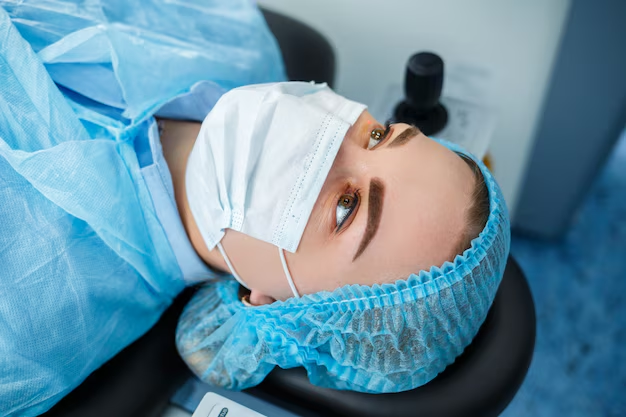Your Guide to What Is The Recovery Period For Cataract Surgery
What You Get:
Free Guide
Free, helpful information about Cataract FAQ and related What Is The Recovery Period For Cataract Surgery topics.
Helpful Information
Get clear and easy-to-understand details about What Is The Recovery Period For Cataract Surgery topics and resources.
Personalized Offers
Answer a few optional questions to receive offers or information related to Cataract FAQ. The survey is optional and not required to access your free guide.
Understanding the Recovery Period for Cataract Surgery: What to Expect
Cataract surgery is one of the most commonly performed procedures worldwide, and for many, it offers a renewed sense of clarity and vision. Yet, it’s natural to have questions about what happens after the surgery. One of the most pressing concerns is often the recovery time. How quickly will everyday life return to normal? What can be expected in the days and weeks following the procedure? This comprehensive guide will delve into these questions, providing insights on the recovery period and related aspects of cataract surgery.
A Glimpse into Cataract Surgery
Cataract surgery involves the removal of the eye's cloudy lens, which is then replaced with a clear artificial lens. For many patients, this procedure is quick and simple, usually lasting less than an hour and typically performed on an outpatient basis.
The Day of Surgery
On the day of surgery, patients can expect to spend a few hours at a surgical center or hospital. The procedure itself is relatively quick. Most patients remain awake during the surgery, though a mild sedative is often provided to help with relaxation.
Immediate Post-Surgery: The Initial Days
First 24 Hours
In the first 24 hours following the surgery, it is common to experience mild discomfort, such as itching or light sensitivity. Doctors will typically recommend resting and avoiding strenuous activities. An eye patch or shield may be prescribed to protect the eye from inadvertent contact and to help healing during sleep.
Quick Recovery Tips ✨
- Rest your eyes: Minimize screen time and give your eyes plenty of breaks from visual stimulation.
- Use prescribed eye drops: They help in preventing infection and reduce inflammation.
- Avoid rubbing your eyes: This could disrupt the healing process.
- Wear protective eyewear: Especially when sleeping, to prevent accidental touching.
Stepping into the First Week
Returning to Routines
Most patients can resume their normal activities such as reading, watching television, and using a computer within a couple of days post-surgery. However, it's crucial to maintain cautionary measures, such as continuing the use of prescribed eye drops.
Common Experiences
During the first week, it's not unusual to experience blurry vision as the eye heals and adjusts. Colors might also appear brighter, and there may be a sensation of a foreign body in the eye. These occurrences are generally temporary and should gradually improve with time.
Weeks Two to Four: Settling In
Increased Activity Levels
As patients progress into the second and third weeks, they usually find that they can gradually return to more physical activities, such as gentle walking. However, anything that might increase the risk of trauma to the eyes should be avoided, including heavy lifting and strenuous exercise.
Vision Adjustment
Vision clarity continues to enhance as healing progresses. It's during this period that patients often realize the full benefits of cataract surgery, enjoying more vibrant colors and improved visual acuity.
A Month and Beyond: Long-Term Outlook
Full Recovery
For most individuals, the vision stabilizes within four to six weeks of the procedure. At this stage, glasses may be prescribed, if needed, for optimal vision enhancement, although many find that their dependence on corrective lenses is significantly reduced.
Long-Term Care
Although the surgical outcome is typically permanent, regular check-ups with an eye care professional are vital to ensure sustained eye health and to address any emergent concerns promptly.
Related Considerations
Temporary Activity Restrictions 🏃♀️
- Avoid swimming pools, hot tubs, or any body of water that can introduce bacteria to the healing eye.
- Steer clear of environments with high pollutants, like construction sites, that can irritate the eyes.
Post-Surgery Symptoms: When to Seek Help
While some discomfort is normal, symptoms such as persistent pain, worsening vision, or signs of infection warrant immediate medical attention.
Lifestyle Adjustments
Many patients report a newfound appreciation for life post-surgery. With better vision, activities such as reading, cooking, and driving become more enjoyable.
Key Takeaways: Navigating the Recovery Journey 📝
- Recovery is generally quick, with most patients resuming normal activities within a few days.
- Monitor symptoms and maintain follow-up appointments for a smooth recovery.
- Protect your eyes from irritants and trauma throughout the recovery period.
- Communicate with healthcare providers about any unusual symptoms.
Empowering Final Insights
Cataract surgery represents a significant step toward improving quality of life for those affected by cloudy vision. While the prospect of this surgery might seem daunting at first, understanding the recovery process demystifies it and prepares patients for a smoother journey. By following medical advice, using prescribed medications, and protecting the eyes during recovery, most individuals can look forward to enjoying clearer vision and a richer experience of the world around them.
Embrace the changes, trust in the process, and don’t hesitate to reach out with any concerns during your recovery. Each step is a leap toward clearer views and brighter days.
What You Get:
Free Cataract FAQ Guide
Free, helpful information about What Is The Recovery Period For Cataract Surgery and related resources.

Helpful Information
Get clear, easy-to-understand details about What Is The Recovery Period For Cataract Surgery topics.

Optional Personalized Offers
Answer a few optional questions to see offers or information related to Cataract FAQ. Participation is not required to get your free guide.


